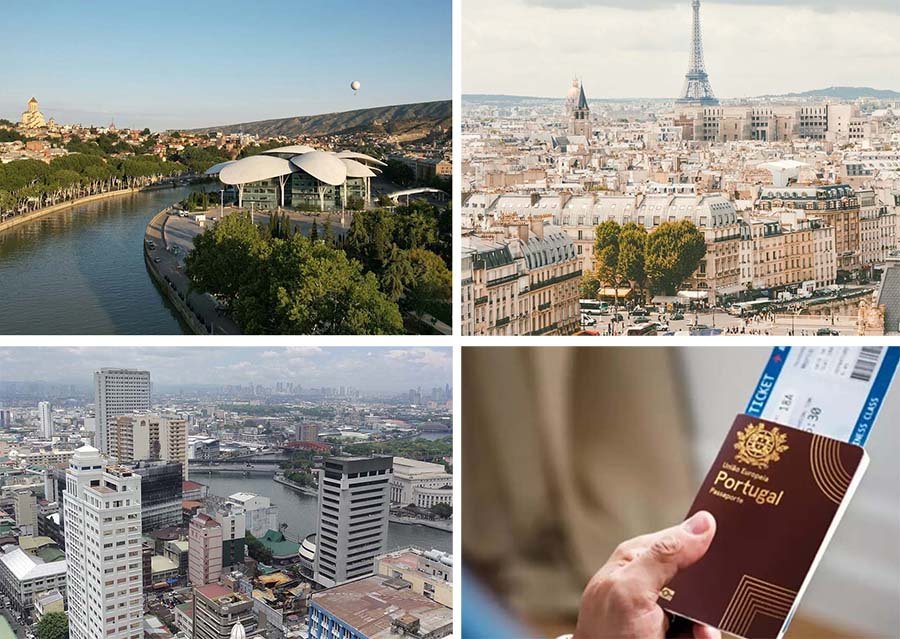Migration News of the Week: Where to Get a Residence Permit and Buy Land

Legislation for foreigners is changing rapidly. Georgia has introduced a new residence permit. France is adjusting its rules in hopes of attracting wealthier expats. Portugal seems ready to drop out of the top most attractive destinations as it struggles with the inflow of newcomers. The Philippines still won’t allow foreign land ownership but has extended lease terms.
Georgia Introduces an IT Residence Permit
As of 1 September 2025, Georgia has launched a new residence permit—issued immediately for three years. It is open to executives of international companies, tech-sector employees, and sole proprietors. The requirements are simple and clear: at least two years of work experience and a minimum income of $25,000 over the previous 12 months.
Family members’ documents can be filed after six months. That doesn’t mean families have to live apart—Georgia has one of the most liberal entry and stay regimes. Citizens of nearly 100 countries may enter visa-free and remain for up to a year, enjoying the climate, nature, and excellent local cuisine. Another big plus is low taxes—sole proprietors with small-business status pay from 1%. Georgia has long been attractive for tech professionals. The new program complements existing incentives for international IT companies and the Virtual Zone regime.
France: Talent and Money
France has changed the rules for the Talent residence category. Applicants for the Salarié qualifié card must earn €39,582 per year, while those seeking the Carte Bleue Européenne must earn €59,373. Talent status can be granted to qualified employees, staff of innovative companies, and intra-corporate transferees.
The required documents include proof of income, a passport, a lease agreement or proof of home ownership, a diploma, and a letter from the employer. To obtain the EU Blue Card, applicants must have a degree equivalent to at least three years of higher education or five years of professional experience, plus an employment contract of at least six months. The Talent card’s validity depends on the contract term and does not exceed four years. Family members are eligible for a simplified residence procedure.
Portugal Doesn’t Want to Unite Hearts
Portugal is debating a bill that would extend the residence period required for citizenship from five to ten years. For citizens of CPLP countries, the term could be seven years. Applicants would need to prove A2-level Portuguese, pass a culture and history test, and have a clean criminal record. The proposal suggests that family members wait a couple of years before reunification and prove financial self-sufficiency. There are also plans to limit job-seeker visas, keeping them for qualified professionals only.
Portugal already hosts 1.5 million foreigners out of a total population of 10.5 million. Applications are so numerous that the processing system is overwhelmed, leaving candidates waiting for years. Hiring 2,000+ staff would help, but the authorities appear to be choosing another route—reducing immigration flows. So far, that hasn’t worked: in August a court ruled several provisions of the bill illegitimate. Parliament will revisit the initiative again this month.
The Philippines Fall Short of a Century
President Ferdinand Marcos Jr. has signed a law changing land-lease rules. Foreign investors can now lease plots not for 50 years—or even 75 as before—but for 99. Ownership is still off-limits, but the system is now seen as more attractive. Authorities and business groups hope foreign investment will surge and support industry, agriculture, and tourism—especially the hotel sector.
For now, the picture is mixed. The inflow of foreign direct investment fell by 27% in January–May 2025. In 2024, FDI was modest at $8.9 billion, while Vietnam exceeded $20 billion and Indonesia reached $24.2 billion. Whether the Philippines can catch up with its neighbors remains unclear. Meanwhile, farmers are outraged, calling the decision a betrayal of national interests, and experts forecast a slowing Philippine economy.








